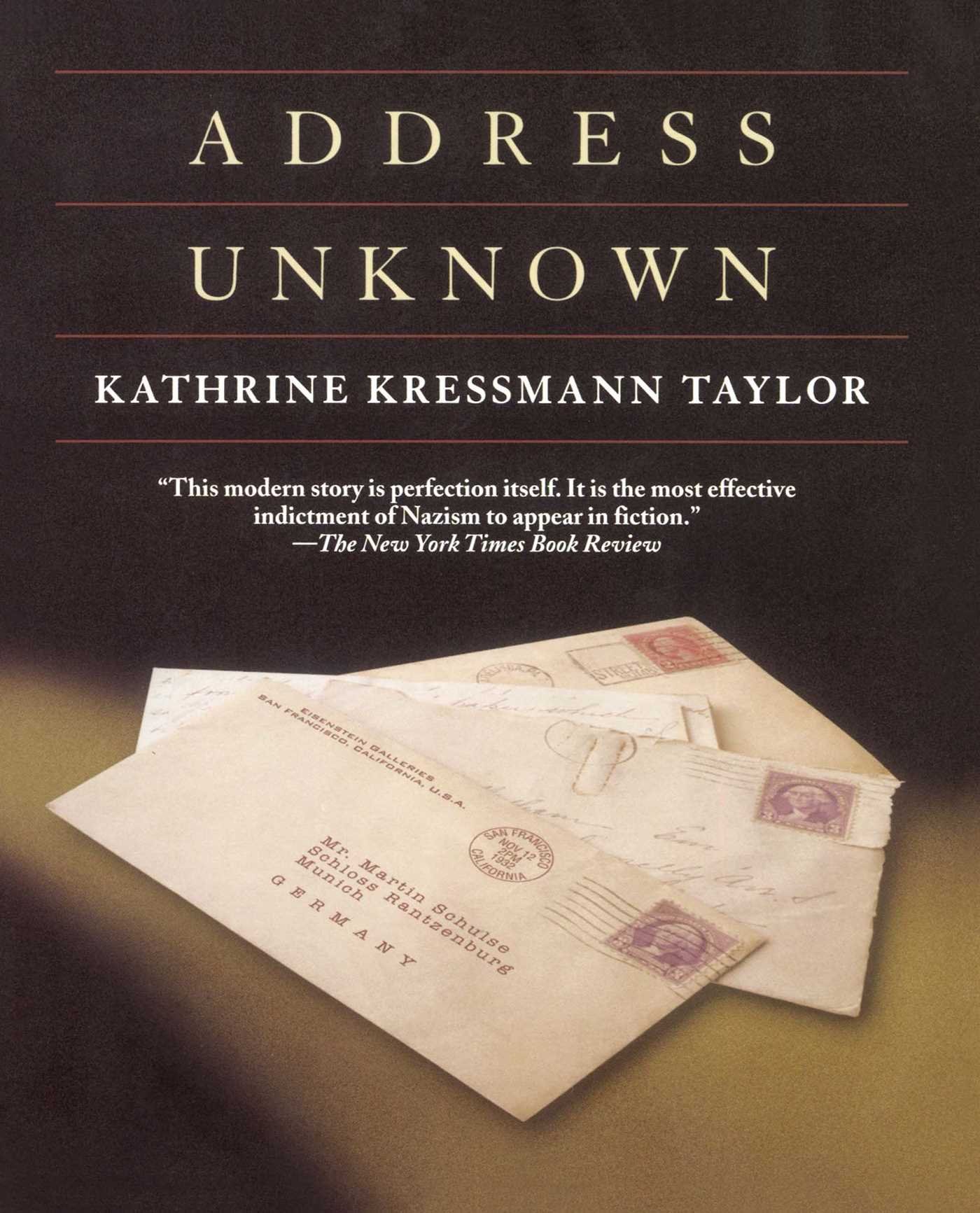Address Unknown is a short epistolary novella with a fascinating plot and a strong message; it was first published in 1938 and its author, Kressmann Taylor, is today almost forgotten.
Max and Martin own a successful art gallery in San Francisco. They are not only business partners but best friends. The bachelor Max is a frequent and welcome guest at Martin’s home and quasi a member of the family; the delicate situation that Max’ sister and Martin have an affair about which Max is aware but keeps quiet to Martin’s wife adds an element of complicity to the relationship between the two friends.
Martin, who has never succeeded in becoming a real American, decides to return to Germany with his growing family. It is the year 1932, and a catastrophe is casting already its long shadows on Germany and Europe. What we read are the fictitious letters and a telegram between Max and Martin, which are an exemplary document for the shocking developments on a large scale in Germany.
The first letters contain the exchange of joint pleasant memoirs, some business news, family developments and also a growing amount of political statements. The friendship between the two once close friends doesn’t survive very long the seizing of the power by the Nazis on 30 January, 1933.
Although Martin has in San Francisco never voiced anti-Semitic opinions, he suddenly talks about the inferiority of the Jews as a race, patronizes local Nazi leaders and finally requests from his former close friend to stop communicating with him. Max reluctantly agrees, but asks for a last time desperately for help from his former friend. His sister has disappeared from her Berlin home and Max’ last letter has returned to him with the stamp “Address Unknown” on it which makes Max fear the worst.
When Martin writes in one of his letters to Max that the pogroms happen because “you (i.e. the Jews) are lamenting all the time, but you don’t have the courage to fight back”, he is committing a serious error that will cost him dearly.
As readers we can relate to both main characters, even to Martin. He is neither a sadist nor a born Jew-hater. He is a victim of the times and political circumstances in which he is entangled; he is a weakling and coward; he has too much to lose and he loves his wealth which he likes to show off a little bit too much – the combination of these characteristics make him the perfect Nazi follower and tool of their policy – just as millions of others that would have been in all probability decent persons and good friends, were it not for the specific circumstances in which they lived.
In a time of growing racism, populism and fascism in many countries, I would like to see this small book read much more; it is an antidote against these evils – and it sets an example that indeed individuals can fight back the Nazis or similar regimes and their followers; maybe not all is lost as long as people are aware that they are usually not completely powerless and can sometimes fight back with success.
A small and very impressive book.

(Kathrine) Kressmann Taylor: Address Unknown, Washington Square Press 2001
© Thomas Hübner and mytwostotinki.com, 2014-6. Unauthorized use and/or duplication of this material without expressed and written permission from this blog’s author and/or owner is strictly prohibited. Excerpts and links may be used, provided that full and clear credit is given to Thomas Hübner and mytwostotinki.com with appropriate and specific direction to the original content.



 Facebook
Facebook RSS
RSS Twitter
Twitter
A fascinating post. I definitely want to read this. Thank you.
Judith (Reader in the Wilderness)
You will not be disappointed, Judith.
Hi Thomas
I’ve just read Fred Uhlman’s Reunion, another wonderful novella that is a powerful “indictment of Nazism” as the blurb to this one says. It also makes clear the way in which basically good people can enlist in such an ideology thinking they have thought it through and made a hard choice, but quite unaware of the real nature of what they’re signing up for.
Thank you, Gert! Reunion touches more or less the same topic as Address Unknown as it seems – an interesting coincidence that makes me want to read that book as well.
Great review, and I totally agree. How can this book still be so relevant in this day and age when we should have learned from the past. Like you, I wish everybody would read this book.
Kaggsy, thanks a lot for your comment!
I totally agree with your review. It is a stunning novella, especially when you think it was written in 1938.
It is a perfect demonstration of how humans can turn inhuman. It doesn’t mean that it’s a fatality, it means it’s a risk and that we are inhabited by strong forces that should not be toyed with. And that’s what non democratic political parties do and excel at : they play on our emotions and fear in particular.
This is a short book that should be in every student’s curriculum, in all Europe at least.
Thank you for your comment, Emma!